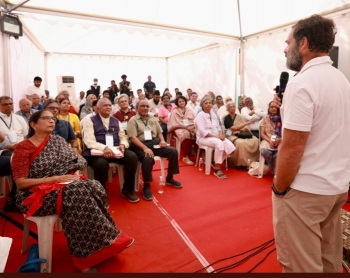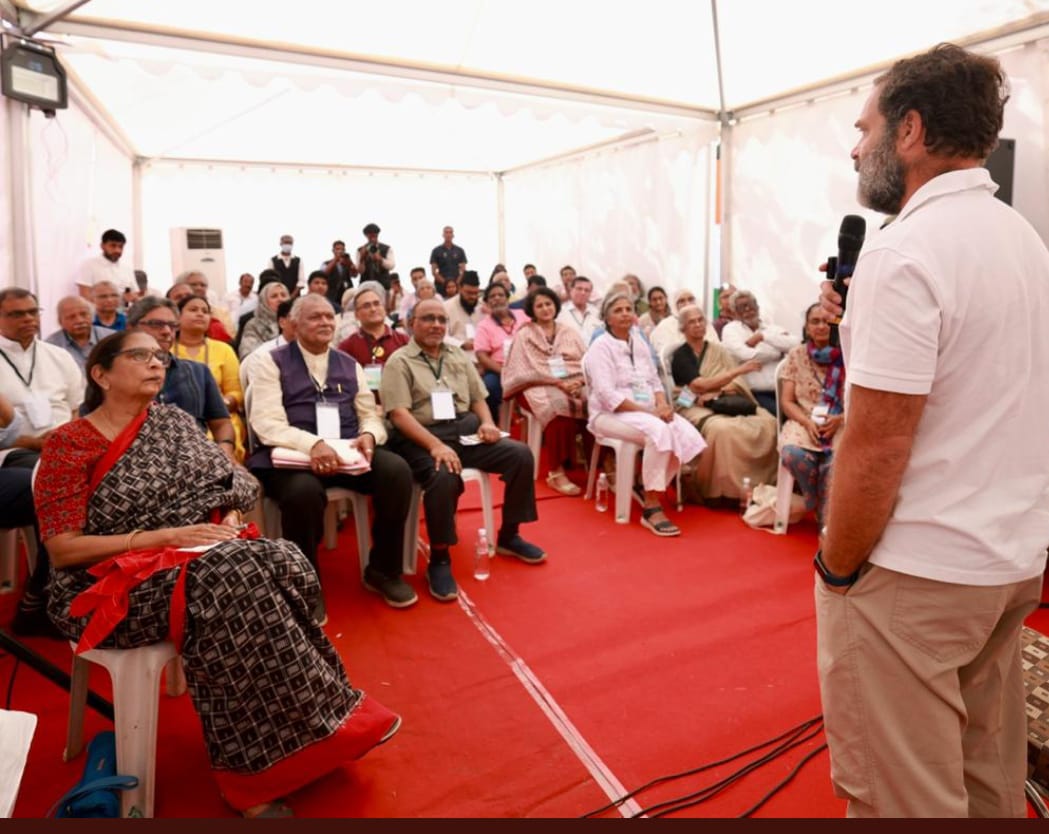
.png) Varghese Theckenath
Varghese Theckenath

The Bharat Jodo Yatra is a “tapasya” (spiritual journey) to seek the soul of India at a time of grave crisis, said Rahul Gandhi, who leads the Kanyakumari to Kashmir march, covering 3,500 kilometers.
Mr Gandhi was interacting with leaders of around 45 civil society groups and intellectuals in Hyderabad where the Indian National Congress party leader reached on the 55th day of the yatra.
The ongoing 150-day mass movement where participants walk by foot (padayatra) began on September 7 from Tamil Nadu’s Kanyakumari, the southernmost tip of the peninsula, and it covered, Kerala, Karnataka, Andhra Pradesh before entering Telangana.
The Yatra started by the Congress Party with the objective of knitting the country together against hatred and divisions has been supported by a large number of independent civil society groups, academics and human rights defenders across religions and castes all over the country.
The interactive session in Hyderabad addressed a wide range of issues such as the reasons for undertaking the yatra, the state of democratic institutions in the country and the economic model in the Modi era.
Calling the yatra “a tapasya,” Mr Gandhi lamented that every democratic, vigilance and security institution in the country has been converted into ideological instruments to serve exclusive sections.
On the economic front, large-scale extraction of wealth has been happening from ordinary citizens to the advantage of a few. Unless urgent corrective measures are taken in the spirit of the Constitution, there is bound to be a major unrest.
Large-scale coercive forces both of the state and of private players are already in place to quell the dissatisfaction. If this is not stopped in their track, there is bound to be immense suffering by the ordinary people, he said.
Mr Gandhi noted that extensive migration is taking place from impoverished rural areas to cities that have no adequate production capacities to absorb them, turning them into lumpen elements serving a political purpose.
The way to overcome the crisis, he explained, is by people organizing themselves to resist and offer alternatives. He quoted the farmers’ strike as an excellent example of how people can organize. In fact, those in power have feet of clay, he said, as their response to the strike manifested.
He talked about his own personal as well as the party's commitment to an inclusive India where all can feel at home and participate in its progress.
The civil society groups put forward several suggestions to save India’s democracy and its institutions such as stressing the responsibility of political parties to educate the masses and organize protests against the trend, effective use of the mass media, social media and alternative media, galvanizing the youth, freeing the media from the clutches of corporates and right-wing groups and withdrawal of draconian laws that target human rights defenders, ordinary citizens and opposition parties.
The meeting urged political parties to take a clear stand on communalization and stop playing soft Hindutva.
Among those who participated in the interaction were Shantha Sinha, first chairperson of the National Child Rights Protection Commission; G. Vinod, dean of the Law faculty, Osmania University; Susie Tharoor, a writer; and Meera Sanghamitra of the National Alliance of People's Movements.
In reply to Ram Manohar Reddy, former editor of the Economic and Political Weekly, Mr. Gandhi said hate-mongering against Dalits, Tribals and minorities is not a hallucination but a reality. “This has to be countered with the antidote of Bharat Jodo (Unite India),” the Congress leader said.